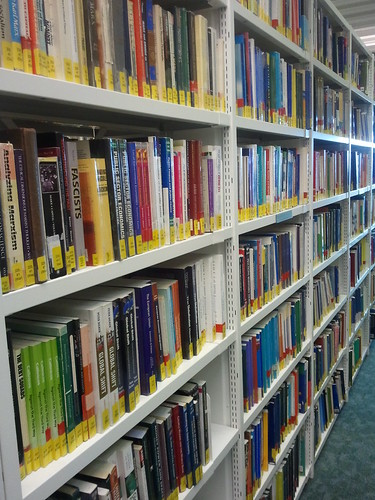RB 200: The Library Of The Future
April 25th, 2012
Listen: or download | …also in Ogg
The technological advancements of the past twenty years have rendered the future of the library as a physical space, at least, as uncertain as it has ever been.
The information that libraries were once built to house in the form of books and manuscripts can now be accessed in the purely digital realm, as evidenced by initiatives like the Digital Public Library of America, which convenes for the second time this Friday in San Francisco.
But libraries still have profound cultural significance, indicating that even if they are no longer necessary for storing books they will continue to exist in some altered form.
Radio Berkman host David Weinberger postulated in his book Too Big To Know that the book itself is no longer an appropriate knowledge container – it has been supplanted by the sprawling knowledge networks of the internet. The book’s subtitle is “Rethinking Knowledge Now That the Facts Aren’t the Facts, Experts Are Everywhere, and the Smartest Person in the Room Is the Room.”
Inspired by the work of Harvard Graduate School of Design students in Biblioteca 2: Library Test Kitchen – who spent the semester inventing and building library innovations ranging from nap carrels to curated collections displayed on book trucks to digital welcome mats – we turned the microphone around and had library expert Matthew Battles ask David, “When the smartest person in the room is the room, how do we design the room?”
Matthew Battles is the Managing Editor and Curatorial Practice Fellow at the Harvard metaLAB. He wrote Library: an Unquiet History and a biography of Harvard’s Widener Library.
David Weinberger is the author of Too Big To Know and a senior researcher at the Berkman Center. He is also the co-director of the Harvard Law School Library Lab.
Listen up! Comment on the show! Tweet us!
![]()
![]() Subscribe to Radio Berkman
Subscribe to Radio Berkman
Reference Section:
Creative Commons licensed photo by Flickr user twechy
Creative Commons licensed music by Rho
This week’s episode produced and edited by Daniel Dennis Jones with Frances Harlow
Entry Filed under: audio,radioberkman
2 Comments Add your own
Leave a Comment
Some HTML allowed:
<a href="" title=""> <abbr title=""> <acronym title=""> <b> <blockquote cite=""> <cite> <code> <del datetime=""> <em> <i> <q cite=""> <s> <strike> <strong>





1. ALGARABÍAS » Berkm&hellip | May 19th, 2012 at 7:05 pm
[…] un podcast sobre cómo diseñar la biblioteca del futuro donde se habla sobre la archivación, conservación y transmisión del conocimiento, sobre la necesidad de transformar las bibliotecas en espacios de interacción y sobre la posibilidad de catalogar los recursos de una biblioteca de nuevas formas, […]
2. Roberto Portolese | February 7th, 2013 at 4:11 pm
Great topic, I would like to talk of the importance of the physical branch of what we call library, from what I can observe in a branch of a local library, I can see students and readers of all ages that can have access to:
a quiet space without having to “purchase” a coffee, and read etc.;
a social place were you can have access to a computer or any future technologies, if you do not have one with you, or own one;
a quiet place for people/students of any age, that at home/residence would not be able to concentrate and have a quiet desk, for a reason or another and also be safe in a public space and sheltered from the weather.
In other simple words, the “physical” is the strength of a library building.
It is quiet and public, (available), space, at the same time, when you do not have a private space.
what you can access there, at a library, will change with technology, it was books and a desk once, it is still books and magazines with a public computer now and with printing capabilities, later it might be a space were we can access to information or technologies that we cannot afford otherwise in space or time of our own at that moment.
It was, it is, or could be, a very high form of physical space of access to a sanctuary of social information/communication democracy.